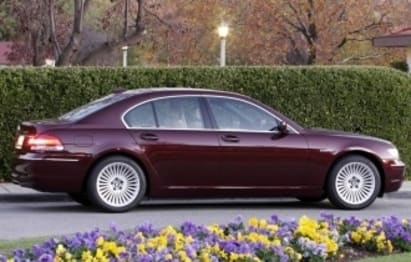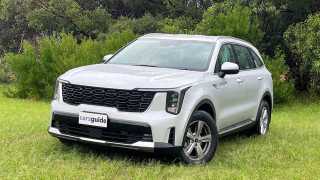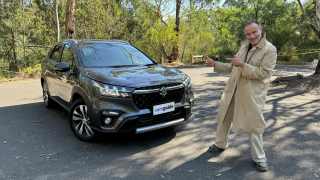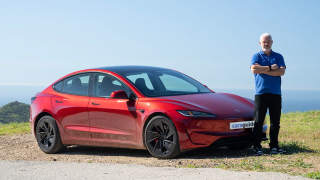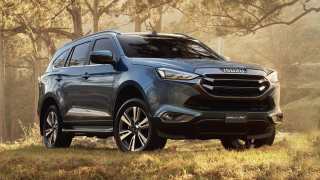
BMW Hydrogen 7 2008 Review
- BMW 7 Series
- BMW 740i
- BMW 740li
- BMW 750i
- BMW 750L
- BMW 750li
- BMW 760li
- BMW 7 Series 2008
- BMW 740i 2008
- BMW 740li 2008
- BMW 750i 2008
- BMW 750L 2008
- BMW 750li 2008
- BMW 760li 2008
- BMW 7 Series Reviews
- BMW 740i Reviews
- BMW 740li Reviews
- BMW 750i Reviews
- BMW 750L Reviews
- BMW 750li Reviews
- BMW 760li Reviews
- BMW Reviews
- BMW Sedan Range
- Sedan
- BMW
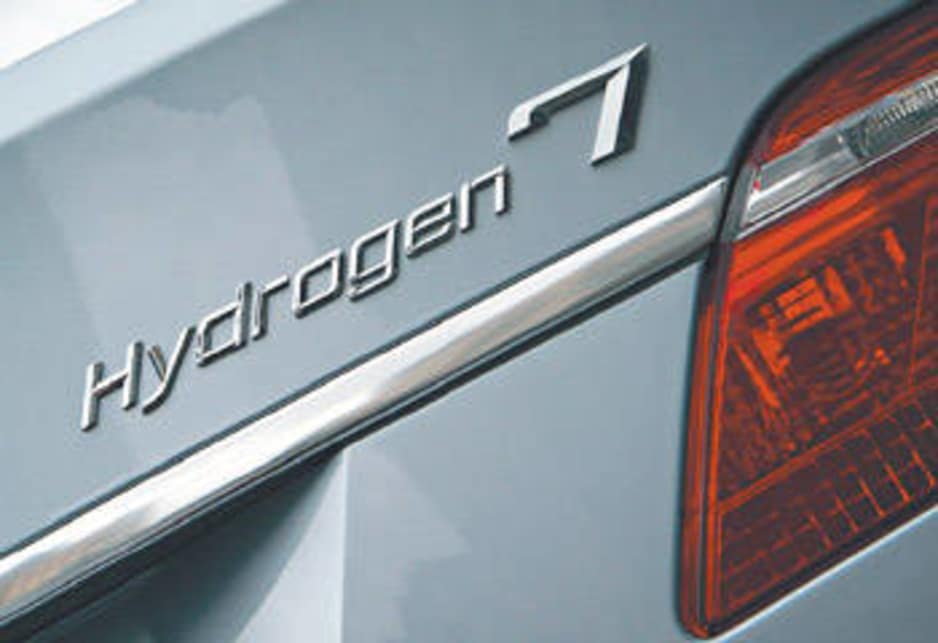
Were it not left-hand drive, there'd be little to mark this BMW as remarkable as it courses along the byways of Melbourne. Looks like a 7 Series sedan, sounds just about like a 7 Series.
This is one of only 100 examples of BMW's Hydrogen 7, a car which we first met 14 months ago in Berlin. Three were brought here last week (along with a specially imported mobile fuelling station) on the on-going international publicity tour.
Hydrogen 7s have been handed out to a selection of such eco-hip superstars as Brad Pitt, Jay Leno and, er, Will Ferrell. Roger Federer has been a bit busy over the past few days, but will accept delivery of one in Switzerland.
It combines a petrol engine, alongside an 8kg liquid hydrogen storage tank, giving this six-litre V12 — good for 191kW/390Nm — a range of more than 700km, including 200km solely by means of hydrogen. The driver switches between fuel sources at the press of a button.
In Germany, with hydrogen filling stations in several major cities (and fuelling from a hydrogen bowser is an almost alarmingly mundane affair), it's possible to get around the country without recourse to petrol. So it is to some extent in California.
In Australia, where even diesel is still considered somewhat exotic in passenger cars, such a journey is still the stuff of science fiction — as is the notion of travelling at the comfortable 170km/h Carsguide drove the Hydrogen 7 on the autobahns of its home country. Yet even in a state whose government's insatiable greed for speed-infringement revenue makes NSW's enforcement regime seem permissive, we get enough out of the Hydrogen 7 to appreciate BMW's launch claim that the driving experience is “spectacularly unspectacular”.
But then the circumstances would have to be straitened indeed not to appreciate the fact that you're punting along a 2.45-tonne sedan powered not by some crude oil derivative or contrived hybrid technology but the most common element in the universe. It's one that as long ago as 1874, the author and visionary Jules Verne called an “inexhaustible source of heat and light”.
Now, with fossil fuels within perhaps 50 years of exhaustion, BMW is adamant that the hydrogen research program it began in 1978 is now at the half-way point towards a fruition that will see hydrogen- powered vehicles become the planet's dominant form of transport. In insisting that hydrogen must be married to combustion engines, though, BMW are talking as much about a sustained standard of living as sustainable mobility.
Critics and proponents of rival technologies have been vitriolic — not least those in Germany. Indeed, on the Hydrogen 7's unveiling, the popular news magazine Der Spiegel declaimed: “BMW has created an energy-guzzling engine that only seems to be environmentally friendly — a farcical ecomobile whose only true merit is that of illustrating the cardinal dilemma of a possible hydrogen-based economy.”
A major cause of disquiet is the production of hydrogen requires significant amounts of energy, while climate-friendly mass production of liquid hydrogen requires a vast supply of electricity.
Jochen Schmallotz, the man running BMW's international hydrogen roadshow, is ready for that one.
“In the next 10 to 20 years we will be able to mass manufacture hydrogen with renewable technology,” he says, pointing to developments that will utilise natural elements in the process.
“Imagine what that means for Australia, a country that has to import most of its oil from the Arabian Gulf.
“You're surrounded by water and you've got plenty of sun.
“You could be self-sufficient in producing hydrogen.”
Other companies, notably Mazda, advocate fuel cells, which transform hydrogen into electricity via a chemical process.
The electricity generated then drives the vehicle. This method promises far greater efficiency, but currently yields modest driving performance — which is the chief reason BMW aren't taken with it, according to Hydrogen 7 project manger Dr Willibald Prestl.
“Advocates of fuel cells say that internal combustion engines have twice the consumption,” he says.
“We definitely do not believe that, not with the engine technology being introduced. Even in the last year we reached reductions (in BMW's existing fleet) of up to 20 per cent.
“We can say a fuel cell has better efficiency and a wider range of use, sure. But there are so many problems not solved: durability, cooling, weight and lifetime.
“We watch this technology very closely but, if there is a breakthrough, it will be in lower-powered cars, not the cars for which BMW is famous.”
Although BMW stands to make not a euro from sales, Prestl says the next step is to produce a smaller capacity bio-fuel car, in 3 Series or 5 Series size.
Ideally, though, he would like to build a car around the still cumbersome and space-eating hydrogen tank, rather than fit one into existing architecture.
For now it's impossible not to be impressed by this marriage of three decades of research to BMW's flagship car.
This mightn't be the marque's quickest car, but it is some way ahead of the field.
SNAPSHOT
BMW HYDROGEN 7
Price: not for sale
Engine: 6L V12, bio fuel
Range: 200km on hydrogen, 500km on petrol
Emissions: zero C02 per kilometre on hydrogen
Performance: reaches 100km/h in 9.4 sec
Pricing guides
Range and Specs
| Vehicle | Specs | Price* | |
|---|---|---|---|
| 740i Executive | 4.0L, PULP, 6 SP AUTO | $27,830 – 33,550 | 2008 BMW 7 Series 2008 740i Executive Pricing and Specs |
| 750i Sport | 4.8L, PULP, 6 SP AUTO | $28,160 – 33,990 | 2008 BMW 7 Series 2008 750i Sport Pricing and Specs |
| 740li | 4.0L, PULP, 6 SP AUTO | $23,650 – 29,150 | 2008 BMW 7 Series 2008 740li Pricing and Specs |
$23,650
Lowest price, based on third party pricing data



